Devastation
At 8:15 A.M., the atomic bomb was dropped and Hiroshima was instantly obliterated.
About 350,000 people are believed to have been in the city at the time of the bombing. This number includes residents, military personnel, and people mobilized from the countryside to do demolition work. It also includes people from places that were colonies at the time, including Korea, Taiwan, and the Chinese mainland, some of whom were impressed and forced to come to Japan. In addition, there were foreign students from China and Southeast Asia and American POWs.
Even today, the exact number of people who died in the bombing is unknown. Although many estimates have been released, our official estimate is 140,000 (+/- 10,000) dead by the end of December 1945, when acute radiation disorders had subsided.
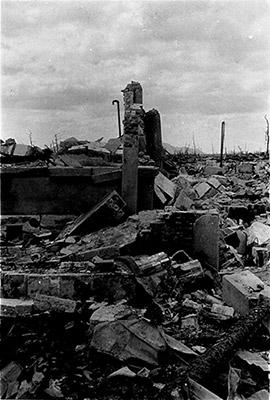
The front entrance of Shima Hospital
The atomic bomb exploded about 600 meters above Shima Hospital.
Shima Hospital opened in 1933. With round pillars and round windows on both sides of the entrance, this modern 2-storey brick building was impressive. Approximately 75 patients and hospital staff were killed by the A-bomb. The day before the bombing the director of the hospital, Kaoru Shima, traveled to a hospital in Kozan, Sera to perform surgery and upon hearing of the bombing, returned to Hiroshima on the evening of the 6th.
October 1945
Photo by Shigeo Hayashi
Courtesy of Tsuneko Hayashi
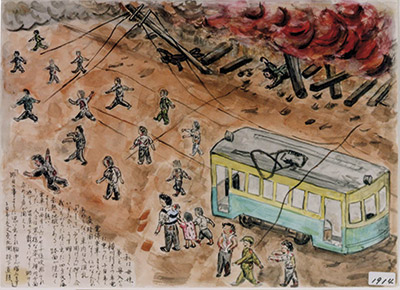
I'm Sorry I Survived
I rode the streetcar from Funairi bound for Yokogawa with my younger brother, younger sister, and my mother. Just after we pulled away from the Tokaichi stop, it became pitch black and I didn't know what was happening. There was a sea of fire in all directions, hot as hell.
In those days, I had been evacuated to my father's parents’ house. My younger brother, younger sister, and mother lived in Funairi. I returned to see my mother on August 5th and spent the night with them. On the morning of the 6th, we were riding the streetcar when we experienced the atomic bombing.
If I hadn't returned to the house in Funairi, my younger brother, younger sister, and mother probably wouldn't have met with tragedy and would have lived happily. I cry and feel sorry that I survived.
Drawn by Masao Matsumoto
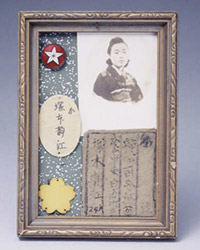
Shizue Tsukamoto
If She Had Left at the Normal Time
Hanayo Tsukamoto's second-born daughter, Shizue Tsukamoto (then, 23), was exposed to the bomb at the Kamiya-cho intersection, close to the hypocenter, while on her way to work from her house in Higashi-hakushima-cho. Following instructions from her workplace, she had left home around 8 A.M., a little later than usual.
Her father, Toshio (then, 51) searched for her and on the 7th learned that she had made her way to Inokuchi Village.
When Toshio arrived in Inokuchi, Shizue was so badly burnt that her father didn't recognize her until he heard her voice, but she was conscious and overjoyed that her father had come for her.
Her family's determination to care for her was in vain as Shizue died on the 10th.
Donated by Hanayo Tsukamoto
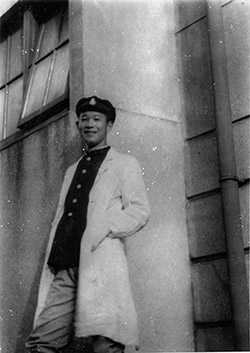
Tsutomu Doguro
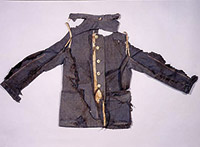
Because His Lunch Was Already Made
Midori Doguro's younger brother, Tsutomu Doguro (then, 20) was a mobilized student, but he had a day off on the 6th. Unaware of this, his mother, Hifumi, prepared his lunch, so Tsutomu figured he would go to work and left the house.
Tsutomu experienced the bombing at the Takanobashi bus stop on his way to work. He was thrown back by the blast and his face was burnt beyond recognition. His bloody shirt stuck to his body.
Tsutomu’s parents were worried when he hadn't returned and searched in earnest for him throughout the city. On the 10th, they learned that he had been received by the Red Cross Hospital, and they brought him home. Day by day, Tsuyoshi weakened, and on the 27th he drew his last breath.
Donated by Midori Doguro
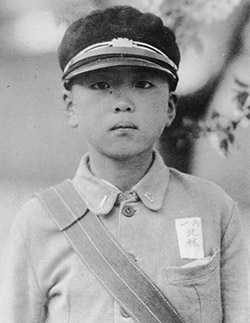
Tetsuo Kitabayashi
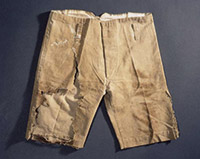
Son's trousers
Hatsue Kitabayashi's third-born son, Tetsuo Kitabayashi (then, 12) transferred into Second Hiroshima Prefectural Junior High School on July 19 because his father, Yudo (then, 53), had been transferred from Wakayama to Hiroshima. Almost a month since starting his new school, Tetsuo was working at a building demolition site when he experienced the atomic bombing.
Tetsuo's parents searched all over town for him, but they kept crossing paths. He had nearly made it back home, but his swollen face looked like a rubber ball and he was covered in a white medicine. It was also impossible to discern his nose and eyes. He died on the seventh, while deliriously humming a military tune.
Yudo felt terrible about having missed his son. In his journal, he wrote that missing him in both the morning and afternoon was regretful and had pained him deeply.
Donated by Hatsue Kitabayashi
